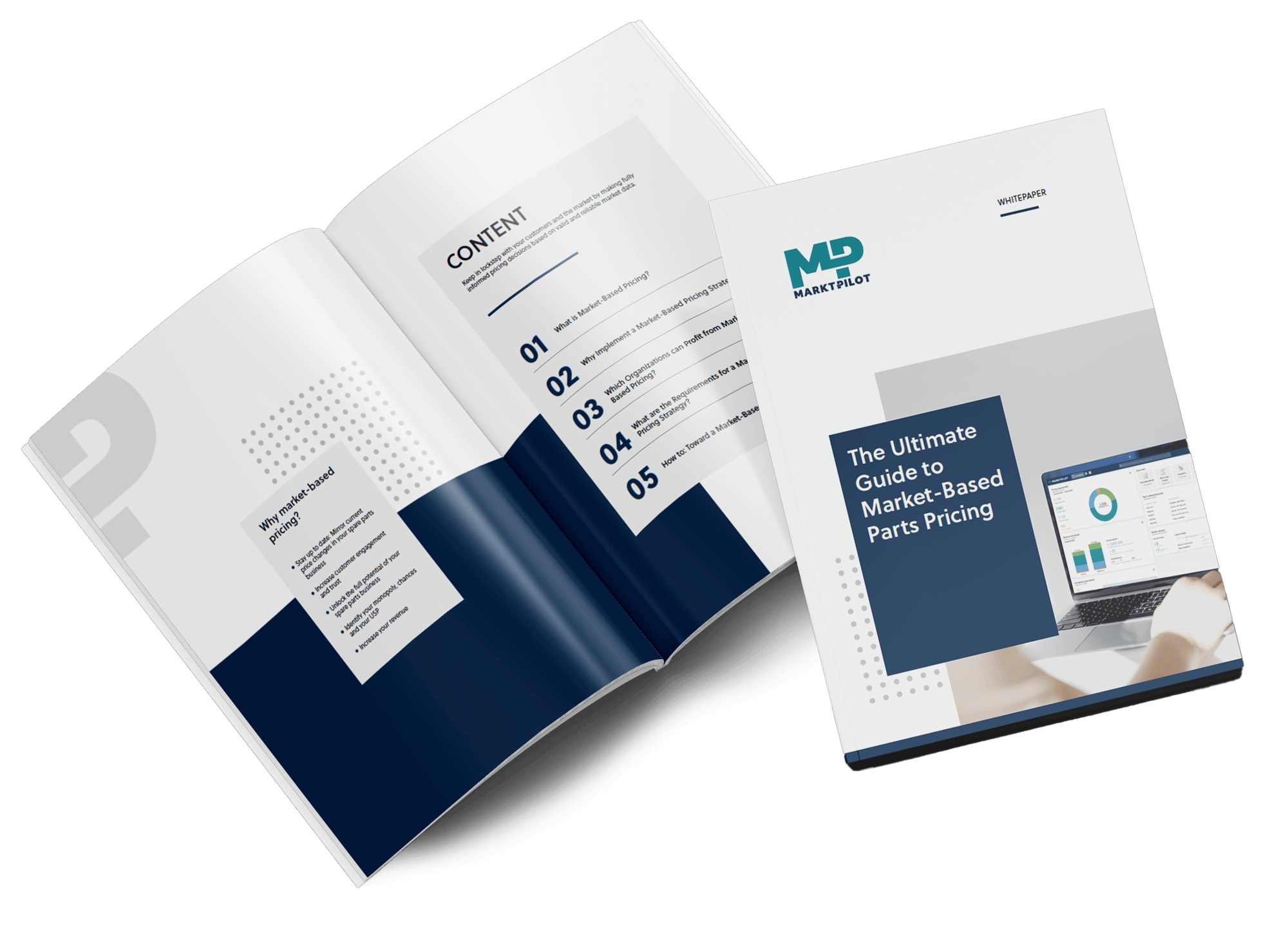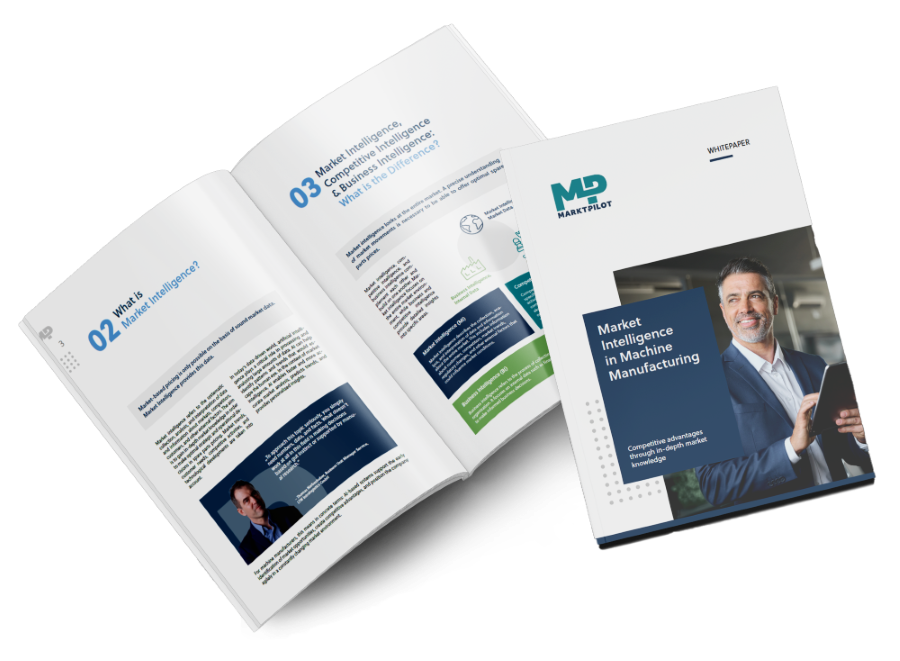AI in the Machine Manufacturing: Gearing Up for a Smart Revolution
Discover how artificial intelligence is transforming the machine manufacturing industry. The webinar review shows innovative ways of digital...
Revenue security is critical for OEMs and machine manufacturers. The ability to anticipate future revenue with a high level of certainty is not only essential for daily business operations but also for long-term growth. In our guide, we’ll explore the concept of revenue security, the key factors that influence it, and strategies for increasing revenue resilience in the machine manufacturing industry.
Revenue security refers to the likelihood of a business to reliably generate income, especially when confronted with external factors that can negatively impact sales. Maintaining a high level of revenue security means implementing strategies, systems and tools for monitoring, predicting and optimizing revenue sources. Revenue security is not merely a financial goal but a strategic imperative that underpins long-term success and industry competitiveness.
Due to the high capital investments, long sales cycles, and operational complexities in producing machinery and equipment, revenue security in machine manufacturing is multifaceted. Achieving revenue security means ensuring not only predictable sales but also a smooth flow of operations and payments. Without reliable revenue generation, machine manufacturers may struggle to meet operational expenses, maintain workforce stability, and fulfill commitments to stakeholders. This, in turn, can impact an organization’s overall viability.
A range of factors can affect revenue security, including market volatility, geopolitical events, operational inefficiencies, customer retention and contract structures. Changes in consumer demand, recessions or expansions, and broader economic shifts like inflation and changes to interest rates can result in unpredictable sales. On the other hand, government subsidies can positively impact sales, by equipping companies in the industries that machine manufactures serve with the necessary capital to invest in machinery.
In times of geopolitical instability, countries and organizations may reduce capital expenditure or postpone large infrastructure projects, leading to a decrease in demand for machinery and equipment. Additionally, tariffs and political conflicts can also have an impact on supply chains and demand for companies operating internationally.
Operational inefficiencies can also have a negative impact on revenue security by disrupting production processes, in turn, affecting the timely delivery of machinery. Supply chain issues can prevent manufacturers from meeting delivery targets as well, potentially leading to lost revenue and reputational damage.
Customer retention and satisfaction also play a significant role in revenue security. Repeat business, be it in the form of purchasing additional machinery or spare parts, creates an additional avenue for stable sources of income. Conversely, if customer expectations are not fulfilled and relationships are not properly managed, machine manufacturers may experience higher churn rates and reduced revenue. Long-term contracts, common in industries like construction and heavy machinery, also provide a consistent revenue stream, helping to reduce uncertainty.
Revenue resilience and revenue assurance are both integral parts of revenue security. While revenue security refers to the overall stability and reliability of a business’ revenue streams, revenue resilience specifically refers to the ability of a business to recover from external disruptions and declines in revenue. When determining revenue stability, it’s important to factor in a company’s revenue resilience.
Revenue assurance is also key to revenue security and relates to the procedures that ensure revenue is accurately recorded and collected.
Revenue resilience refers to the ability of a business to endure disruptions and carry out a swift recovery from declines in revenue, ensuring minimal long-term impact on its overall finacial stability.
Revenue assurance describes processes to prevent revenue loss due to errors, fraud, or inefficinecies. It focuses on ensuring that all revenue is accurately captured, billed, and collected.
A stable financial foundation allows machine manufacturers to confidently invest in their future. Without a high level of revenue security, cash flow difficulties may arise, impacting an organization’s ability to meet operational expenses, pay suppliers and invest in research and development initiatives. As the industry continues to undergo a vast digital transformation, having the capital to fund research and development is not only critical for growth but also for keeping up with current changes to industry standards and customer expectations. Having predictable revenue streams allows companies to plan investments and build a solid pipeline for future products.
Beyond the relationship with suppliers and customers, revenue security is also vital to employees and shareholders. The machine manufacturing industry is currently dealing with a significant talent gap, with challenges in attracting and retaining skilled workers. A secure revenue stream communicates job stability to employees as well as the ability to invest in workforce development, upskilling programs, and a culture of innovation. This can help reduce turnover, as staff feel confident in the company’s future and their role within it. A steady and reliable revenue stream also allows machine manufacturers to offer competitive wages and invest in automation solutions to offset the lack of available skilled workers.
US manufacturing is expected to have 2.1 million unfilled jobs by 2030.
- The Manufacturing Institute, 2021
For shareholders, revenue security in machine manufacturing is crucial because it ensures predictable returns on their investments. Shareholders expect steady growth, profitability, and dividends, which are all heavily dependent on consistent revenue from machine sales, maintenance contracts, and aftermarket services.

In our Ultimate Guide to Market-Based Pricing, you'll gain necessary knowledge and insights related to the nature and implementation of market-based pricing strategies. Learn how to make pricing in the parts business even more effective and profitable.
Achieving a high level of revenue security is not without its challenges. There are various obstacles that undermine efforts and initiatives to ensure steady and reliable income streams. These include macroeconomic conditions, increased competition, shifting customer expectations, supply chain disruptions and revenue leakage.

One of the primary ways to build revenue security is through revenue diversification. Doing so reduces financial risks that result from dependency on a single revenue stream. In addition to diversification, machine manufacturers can also use the following strategies in order to increase their revenue security and resilience.
Securing long-term agreements with customers provides predictable income over extended periods. Maintenance contracts, service-level agreements, and exclusive supply arrangements are common ways machine manufacturers have traditionally generated stable revenue streams.
For many machine manufacturers, aftermarket sales are not simply a complementary revenue stream but a primary one. Developing a strategic approach to parts pricing can contribute to higher sales volumes and increased profitability.
Providing an exceptional level of service can also help to generate recurring income. Offering timely maintenance, technical support, and performance optimization services ensures customer satisfaction and establishes long-term trust, setting the stage for repeat purchases.
Long-term contracts, spare parts sales, and exceptional service have been key pillars in ensuring stable income streams. However, with the rapid advancement of technology and growing demand for sustainability, the processes for revenue generation and security are changing. Below are just a few trends that can be used to improve revenue security in the machine manufacturing industry:

In our whitepaper Market Intelligence in Machine Manufacturing, you will learn everything about market intelligence and the role AI plays in increasing revenue security, particularly in the aftermarket of machine manufacturing.
Embracing digital technologies can drive efficiency for revenue security analysis and processes. There are a range of different systems and platforms that machine manufacturers can use to analyze revenue patterns, pinpoint potential revenue sources and ensure revenue security.
Demand planning and sales forecasting
Demand planning and sales forecasting systems can help machine manufacturers anticipate market trends, align production with demand, and identify potential revenue gaps. Such tools make it possible to address uncertainties proactively, ensuring financial stability and operational efficiency.
Customer Relationship Management
With repeat business serving as a cornerstone of revenue sustainability, machine manufacturers can also benefit from using customer relationship management systems (CRMs). Having a centralized platform to track client interactions makes it easier to analyze past purchases and service requests, which can aid in identifying opportunities for upselling or cross-selling complementary products and services.
65% of revenue in the construction equipment industry comes from aftermarket and service, just ahead of aircraft engines and mining equipment (both 55 percent) and HVAC (50 percent).
- McKinsey, 2024
Pricing Software
Another way to uncover potential revenue opportunities is with intelligent pricing tools, such as MARKT-PILOT’s spare parts pricing software. By continuously aligning pricing with market trends and customer expectations, machine manufacturers and OEMs can increase their revenue while maintaining their competitive advantage.
Contract Management
Contract management and accounts receivable software can also play a pivotal role in safeguarding revenue by streamlining the creation, execution, and monitoring of agreements and payments. Mismanagement of agreements can lead to disputes and delays, and, in some cases, financial losses. Features such as automated alerts for contract renewal dates and payment deadlines minimize the risk of revenue leakage as well as the risk of contractual obligations being overlooked. By examining historical payment patterns, machine manufacturers can identify clients with recurring late payments, and flag high-risk accounts, allowing for the adjustment of payment terms and the implementation of early intervention strategies.
Static price lists and reactive price adjustments no longer meet current market demands, which is why the traditional cost-plus logic needs to be rethought. Especially in dynamic and volatile times, one of the greatest challenges in the service sector is meeting the continuously changing customer requirements while ensuring stable revenue streams.
Thomas Narbeshuber, Business Unit Manager Service at LTW Intralogistics GmbH, aptly summarizes the current situation in service: "The challenge in after sales is to meet the constantly changing requirements of customers as a logistics supplier, especially in increasingly dynamic and volatile times." But how can these processes be made sustainabily efficient and profitable?
INNOVATIVE PRICING STRATEGIES TO FOSTER TRUST AND REVENUE SECURITY
The solution? To maintain competitiveness, an intelligent pricing strategy is imperative. This entails creating a simple pricing model seamlessly integrated into existing processes and easily maintained.
With the implementation of MARKT-PILOT, LTW Intralogistics has adopted a lean and scalable solution, positioning the company as a fair and reliable partner for its customers in terms of both availability and prices.The software's swift deployment without the need for extensive implementation enables a quick start.
Revenue security is a fundamental aspect of ensuring the long-term success of machine manufacturing companies. By prioritizing strategies that establish predictable and stable income streams, machine manufacturers are not only able to more confidently navigate challenges outside of their organizations but are also able to position themselves to innovate and grow in an increasingly competitive market.

Discover how artificial intelligence is transforming the machine manufacturing industry. The webinar review shows innovative ways of digital...
The industry conference for aftermarket and pricing in machine manufacturing professionals is gearing up for its 2025 event.
Following Trump's announcements of sweeping global tariffs, a historic trade war is imminent in 2025. Read now how your business can remain...
Revenue security refers to the degree of confidence a company has regarding the stability and predictability of its revenue streams, both currently and in the foreseeable future.
Machine manufacturers can achieve revenue security by diversifying their sources of income, securing long-term contracts, focusing on customer retention, optimizing pricing strategies, and leveraging data analytics.
Long-term contracts provide predictable, steady income for extended periods of time, helping machine manufacturers to mitigate the risks of market volatility and fluctuating demand.
Spare parts sales can be a significant contributor to revenue security, as they extend the lifecycle of machines, are less vulnerable to market fluctuations and often generate higher margins than sales of new machines.
Economic factors like inflation, interest rates, and market conditions can directly impact demand for products and services, affecting a company’s ability to maintain stable and predictable revenue over longer periods of time.
Data-driven decision-making allows businesses to anticipate shifts in market demand, optimize pricing strategies, and forecast revenue more accurately.